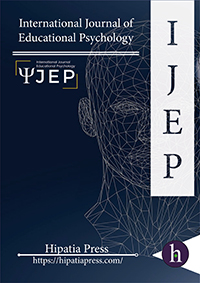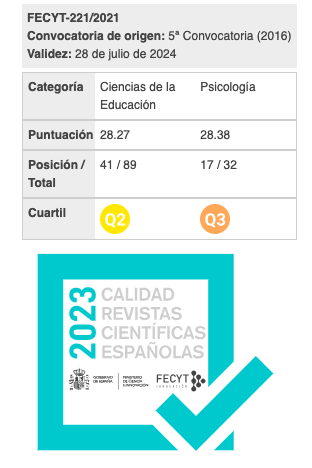Students’ Text-Picture-Integration: The Role of Teacher Competence and Instructional Quality
Keywords:
Abstract
Learning material often consists of texts and instructional pictures, meaning the reader must extract and integrate information from two sources. Research shows that students’ skills in integrating texts and pictures already vary in early secondary school. Teachers’ professional competence and quality of instruction are important influences on the development of student’s skills. Therefore, this study examines teachers’ professional competence in teaching with texts, instructional pictures, and instructional quality as predictors for developing students’ text-picture-integration skills. Data from 136 fourth-grade teachers were collected in Germany. A subsample of 34 teachers and 646 fourth graders participated in a video study investigating instructional quality. In a longitudinal study, we assessed teachers’ competence in teaching with texts and instructional pictures via questionnaires and tested students’ text-picture-integration-skills. In between, three lessons involving texts and instructional pictures were videotaped and analysed. Multilevel regression models showed a small positive direct effect of teachers’ knowledge about student abilities on students’ text-picture-integration-skills. Furthermore, aspects of teachers’ competence were positively related to instructional quality, whereas “clarity and structure” positively predicted students’ text-picture-integration-skills. The presented paper contributes to research on text-picture-integration in primary school and how teachers and instruction can facilitate it.
Downloads
References
Ainsworth, S. (2006). DeFT: A conceptual framework for considering learning with multiple representations: A conceptual framework for considering learning with multiple representations. Learning and Instruction, 16(3), 183–198. https://doi.org/10.1016/j.learninstruc.2006.03.001
Google Scholar CrossrefAustralian Council for Educational Research. (2007). ConQuest [Computer software].
Google Scholar CrossrefAyres, P., & Sweller, J. (2005). The Split-Attention Principle in Multimedia Learning. In R. E. Mayer (Ed.), The Cambridge handbook of multimedia learning (pp. 135–146). Cambridge University Press. https://doi.org/10.1017/CBO9780511816819.009
Google Scholar CrossrefBaumert, J., & Kunter, M. (2013). The COACTIV Model of Teachers’ Professional Competence. In M. Kunter, J. Baumert, W. Blum, U. Klusmann, S. Krauss, & M. Neubrand (Eds.), Mathematics teacher education: v. 8. Cognitive activation in the mathematics classroom and professional competence of teachers: Results from the COACTIV project (pp. 25–48). Springer. https://doi.org/10.1007/978-1-4614-5149-5_2
Google Scholar CrossrefBond, T. G., & Fox, C. M. (2007). Applying the Rasch model: Fundamental measurement in the human sciences (2nd ed). Lawrence Erlbaum Associates Publishers.
Google Scholar CrossrefBrunken, R., Plass, J. L., & Leutner, D. (2003). Direct Measurement of Cognitive Load in Multimedia Learning. Educational Psychologist, 38(1), 53–61. https://doi.org/10.1207/S15326985EP3801_7
Google Scholar CrossrefChung, H., Kim, J. I., Jung, E., & Park, S [Soyoung] (2022). An International Comparison Study Exploring the Influential Variables Affecting Students’ Reading Literacy and Life Satisfaction. International Journal of Educational Psychology, 11(3), 261–292. https://doi.org/10.17583/ijep.8924
Google Scholar CrossrefDarling-Hammond, L. (2021). Defining teaching quality around the world. European Journal of Teacher Education, 44(3), 295–308. https://doi.org/10.1080/02619768.2021.1919080
Google Scholar CrossrefGanzeboom, H. B. G., de Graaf, P. M. , & Treiman, D. J. (1992). A standard international socio-economic index of occupational status. Social Science Research : A Quarterly Journal of Social Science Methodology and Quantitative Research(21), 1–56. https://doi.org/10.1016/0049-089X(92)90017-B
Google Scholar CrossrefGess-Newsome, J., Taylor, J. A., Carlson, J., Gardner, A. L., Wilson, C. D., & Stuhlsatz, M. A. M. (2019). Teacher pedagogical content knowledge, practice, and student achievement. International Journal of Science Education, 41(7), 944–963. https://doi.org/10.1080/09500693.2016.1265158
Google Scholar CrossrefHan, J., & Yin, H. (2016). Teacher motivation: Definition, research development and implications for teachers. Cogent Education, 3(1), 1217819. https://doi.org/10.1080/2331186X.2016.1217819
Google Scholar CrossrefHeller, K. A., & Perleth, C. (2000). KFT 4-12+ R: Kognitiver Fähigkeitstest für 4. bis 12. Klassen, Revision [KFT 4-12+R: Cognitive Ability Test for Grades 4-12, Revision]. Hogrefe.
Google Scholar CrossrefHochpöchler, U., Schnotz, W., Rasch, T., Ullrich, M., Horz, H., McElvany, N., & Baumert, J. (2013). Dynamics of mental model construction from text and graphics. European Journal of Psychology of Education, 28(4), 1105–1126. https://doi.org/10.1007/s10212-012-0156-z
Google Scholar CrossrefIBM Corp. (2013). IBM SPSS Statistics for Windows, Version 22.0. IBM Corp.
Google Scholar CrossrefKlassen, R. M., Yerdelen, S., & Durksen, T. L. (2013). Measuring Teacher Engagement: Development of the Engaged Teachers Scale (ETS). Frontline Learning Research, 1(2), 33–52. https://doi.org/10.14786/flr.v1i2.44
Google Scholar CrossrefKunter, M., Klusmann, U., Baumert, J., Richter, D., Voss, T., & Hachfeld, A. (2013). Professional competence of teachers: Effects on instructional quality and student development. Journal of Educational Psychology, 105(3), 805–820. https://doi.org/10.1037/a0032583
Google Scholar CrossrefKyriakides, L., Christoforou, C., & Charalambous, C. Y. (2013). What matters for student learning outcomes: A meta-analysis of studies exploring factors of effective teaching. Teaching and Teacher Education: An International Journal of Research and Studies, 36, 143–152. https://doi.org/10.1016/j.tate.2013.07.010
Google Scholar CrossrefLeuchter, M., Saalbach, H., Studhalter, U., & Tettenborn, A. (2020). Teaching for conceptual change in preschool science: relations among teachers’ professional beliefs, knowledge, and instructional practice. International Journal of Science Education, 42(12), 1941–1967. https://doi.org/10.1080/09500693.2020.1805137
Google Scholar CrossrefMayer, R. E. (Ed.). (2014). The Cambridge Handbook of Multimedia Learning. Cambridge University Press. https://doi.org/10.1017/CBO9781139547369
Google Scholar CrossrefMayer, R. E., & Fiorella, L. (2014). Principles for Reducing Extraneous Processing in Multimedia Learning: Coherence, Signaling, Redundancy, Spatial Contiguity, and Temporal Contiguity Principles. In R. E. Mayer (Ed.), The Cambridge Handbook of Multimedia Learning (pp. 279–315). Cambridge University Press. https://doi.org/10.1017/CBO9781139547369.015
Google Scholar CrossrefMcElvany, N., Schroeder, S., Baumert, J., Schnotz, W., Horz, H., & Ullrich, M. (2012). Cognitively demanding learning materials with texts and instructional pictures: teachers’ diagnostic skills, pedagogical beliefs and motivation. European Journal of Psychology of Education, 27(3), 403–420. https://doi.org/10.1007/s10212-011-0078-1
Google Scholar CrossrefMuthén, L. K., & Muthén, B. O. (1998-2012). Mplus User’s Guide. Version 7. Muthén & Muthén.
Google Scholar CrossrefOerke, B., McElvany, N., Ohle-Peters, A., Horz, H., & Ullrich, M. (2019). The impact of instruction and student characteristics on the development of students’ ability to read texts with instructional pictures. European Journal of Psychology of Education, 34(2), 375–395. https://doi.org/10.1007/s10212-018-0375-z
Google Scholar CrossrefOhle, A., & McElvany, N. (2016). Erfassung von Unterrichtsqualität in der Grundschule: Kognitiver Anspruch, Strukturierung und Motivierungsqualität [Assessment of Instructional Quality in Primary School: Cognitive Demand, Structure, and Quality of Motivation]. In N. McElvany, W. Bos, H. G. Holtappels, M. Gebauer, & F. Schwabe (Eds.), Dortmunder Symposium der Empirischen Bildungsforschung: Vol. 1. Bedingungen und Effekte guten Unterrichts (pp. 117–134). Waxmann.
Google Scholar CrossrefOhle, A., McElvany, N., Schnotz, W., Wagner, I., Horz, H., Ullrich, M., & Baumert, J. (2017). Development and Evaluation of a Competency Model for Teaching Integrative Processing of Texts and Pictures (BiTe). In D. Leutner, J. Fleischer, J. Grünkorn, & E. Klieme (Eds.), Competence Assessment in Education - Research, Models and Instruments (pp. 167–180). Springer. https://doi.org/10.1007/978-3-319-50030-0_11
Google Scholar CrossrefOpfermann, M., Schmeck, A., & Fischer, H. E. (2017). Multiple Representations in Physics and Science Education – Why should we use them? In D. F. Treagust, R. Duit, & H. E. Fischer (Eds.), Multiple Representations in Physics Education (pp. 1–22). Springer International Publishing. https://doi.org/10.1007/978-3-319-58914-5_1
Google Scholar CrossrefPaivio, A. (1990). Mental Representations. Oxford University Press. https://doi.org/10.1093/acprof:oso/9780195066661.001.0001
Google Scholar CrossrefPajares, M. F. (1992). Teachers’ beliefs and educational research: Cleaning up a messy construct. Review of Educational Research, 62(3), 307–332. https://doi.org/10.3102/00346543062003307
Google Scholar CrossrefPamuk, S., Sungur, S., & Oztekin, C. (2017). A Multilevel Analysis of Students’ Science Achievements in Relation to their Self-Regulation, Epistemological Beliefs, Learning Environment Perceptions, and Teachers’ Personal Characteristics. International Journal of Science and Mathematics Education, 15(8), 1423–1440. https://doi.org/10.1007/s10763-016-9761-7
Google Scholar CrossrefPark, S., & Oliver, J. S. (2008). Revisiting the conceptualisation of Pedagogical Content Knowledge (PCK): PCK as a conceptual tool to Understand Teachers as Professionals. Research in Science Education, 38(3), 261–284. https://doi.org/10.1007/s11165-007-9049-6
Google Scholar CrossrefPeterson, M., Delgado, C., Tang, K. S., Bordas, C., & Norville, K. (2021). A taxonomy of cognitive image functions for science curriculum materials: identifying and creating ‘performative’ visual displays. International Journal of Science Education, 43(2), 314–343. https://doi.org/10.1080/09500693.2020.1868609
Google Scholar CrossrefPraetorius, A. K., & Charalambous, C. Y. (2018). Classroom observation frameworks for studying instructional quality: looking back and looking forward. ZDM, 50(3), 535–553. https://doi.org/10.1007/s11858-018-0946-0
Google Scholar CrossrefRichter, J., Scheiter, K., & Eitel, A. (2018). Signaling text–picture relations in multimedia learning: The influence of prior knowledge. Journal of Educational Psychology, 110(4), 544–560. https://doi.org/10.1037/edu0000220
Google Scholar CrossrefRyan, R. M., & Deci, E. L. (2020). Intrinsic and extrinsic motivation from a self-determination theory perspective: Definitions, theory, practices, and future directions. Contemporary Educational Psychology, 61, 101860. https://doi.org/10.1016/j.cedpsych.2020.101860
Google Scholar CrossrefSchnotz, W., & Bannert, M. (2003). Construction and interference in learning from multiple representation. Learning and Instruction, 13(2), 141–156. https://doi.org/10.1016/S0959-4752(02)00017-8
Google Scholar CrossrefSchroeder, S., Richter, T., McElvany, N., Hachfeld, A., Baumert, J., Schnotz, W., Horz, H., & Ullrich, M. (2011). Teachers’ beliefs, instructional behaviors, and students’ engagement in learning from texts with instructional pictures. Learning and Instruction, 21(3), 403–415. https://doi.org/10.1016/j.learninstruc.2010.06.001
Google Scholar CrossrefShah, P., & Hoeffner, J. (2002). Review of graph comprehension research: Implications for instruction. Educational Psychology Review, 14(1), 47–69. https://doi.org/10.1023/A:1013180410169
Google Scholar CrossrefShulman, L. S. (1986). Those Who Understand: Knowledge Growth in Teaching: Knowledge growth in teaching. Educational Researcher, 15(2), 4–14. https://doi.org/10.3102/0013189X015002004
Google Scholar CrossrefTarelli, I., Valtin, R., Bos, W., Bremerich Vos, A., & Schwippert, K. (2012). IGLU 2011: Wichtige Ergebnisse im Uberblick [PIRLS 2011: Overview of Major Results]. In W. Bos, I. Tarelli, A. Bremerich Vos, & K. Schwippert (Eds.), IGLU 2011: Lesekompetenzen von Grundschulkindern in Deutschland im internationalen Vergleich (S 11-25).
Google Scholar CrossrefTitsworth, S., Mazer, J. P., Goodboy, A. K., Bolkan, S., & Myers, S. A. (2015). Two Meta-analyses Exploring the Relationship between Teacher Clarity and Student Learning. Communication Education, 64(4), 385–418. https://doi.org/10.1080/03634523.2015.1041998
Google Scholar CrossrefPublished
Almetric
Dimensions
How to Cite
Issue
Section
License
Copyright (c) 2023 Annika Ohle-Peters; Nele McElvany; Mark Ullrich

This work is licensed under a Creative Commons Attribution 4.0 International License.
All articles are published under Creative Commons copyright (CC BY). Authors hold the copyright and retain publishing rights without restrictions, but authors allow anyone to download, reuse, reprint, modify, distribute, and/or copy articles as the original source is cited.
















